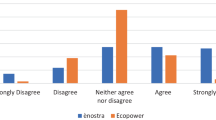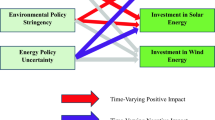Abstract
This article utilises a GVC analytic framework to analyse the wind energy value chain in South Africa and its impact on localisation of goods and services. Its theoretical contribution highlights governance as dependent on system integration dynamics, with lead firms operating as system integrators. The empirical analysis focuses on the interplay between energy and industrial policy showing how policy failure, driven by coal-based vested interests, disrupted system integration and undermined the renewable energy programme. The failure to ensure continuity and predictability of the auction bidding process within energy policy cascaded down the wind energy chain negatively impacting industrial policy attempts to localise domestic and foreign enterprises. This also derived from the South African government failing to prioritise, develop, and embed renewable energy as a green economy strategy within its industrial policy framework. We conclude with the following lessons: (a) GVC dynamics and lead firms cannot be ignored if localisation is to take root; (b) green strategies should be mainstreamed within industrial policy; (c) localisation starts with lead firms encouraging follower sourcing of first tier suppliers; (d) localising domestic value-added services is just as important as developing manufacturing enterprises.

Similar content being viewed by others
References
Appio, F. P., & Lacoste, S. 2019. B2B relationship management in complex product systems (CoPS). Industrial Marketing Management, 79: 53–57.
Baker, L. 2016. Technology development in South Africa: The case of wind and solar PV. Working Paper, SPRU series, Sussex University.
Baker, L., & Sovacool, B. 2017. The political economy of technological capabilities and global production networks in South Africa’s wind and solar photovoltaic (PV) industries. Political Geography., 60: 1–12.
Baker, L., & Wlokas, H. L. 2015. South Africa’s renewable energy procurement: A new frontier? University of Cape Town, Cape Town, South Africa.
Barnes, J., & Morris, M. 2004. The German connection: Shifting power in the political economy of the South African Automotive Industry. Industrial and Corporate Change, 13(5): 789–814.
Chipkin, I., Swilling, M., Peter, C., Friedenstein, H., Bhorat, H., Mondi, L., Buthelezi, M., Qobo, M., Prins, N., & Duma, S. 2018. Shadow state: The politics of state capture. Wits University Press.
Dalle, D., Fossati, V., & Lavopa, F. 2013. Industrial policy and developmental space: The missing piece in the GVCs debate, Revista Argentina de Economía Internacional, 2, December.
Davies, A., & Hobday, M. 2005. The business of projects: Managing innovation in complex products and systems. Cambridge University Press.
Davis, D., Kaplinsky, R., & Morris, M. 2017. Rents, power and governance in global value chains, Journal of World. Systems Research, 24(1): 43–71.
Department of Trade and Industry. 2016. Investment flows, economic development, and localization under the REIPPPP. PowerPoint Presentation from the Chief Directorate: Green Industries. Obtained through personal communication with DTI officials.
Department of Trade and Industry. 2018. Industrial Policy Action Plan 2018/19 to 2020/21. The Department of Trade and Industry: Pretoria. Retrieved June 19, 2019 from http://www.thedtic.gov.za/sectors-and-services-2/industrial-development/national-industrial-policy-framework/.
Eberhard, A. 2020. New coal and nuclear power proposals undermine prospects of a post-Covid-19 economic recovery, Daily Maverick, 17 June 2020.
Eberhard, A., Kolker, J., & Leighland, J. 2014. South Africa’s renewable energy IPP procurement program: Success factors and lessons. World Bank.
Eberhard, A., & Naude, R. 2017. The South African renewable energy IPP procurement programme: Review, lessons learned & proposals to reduce transaction costs. Graduate School of Business, University of Cape Town. Retrieved June 19, 2019 from http://www.gsb.uct.ac.za/files/EberhardNaude_REIPPPPReview_2017_1_1.pdf.
Elola, A., Parrilli, M., & Rabellotti, R. 2013. The resilience of clusters in the context of increasing globalization: The Basque wind energy value chain. European Planning Studies, 21(7): 989–1006.
Ettmayr, C., & Lloyd, H. 2017. Local content requirements and the impact on the South African renewable energy sector: A survey-based analysis. South African Journal of Economic and Management Sciences, 20(1): 1–11. https://doi.org/10.4102/sajems.
Gereffi, G. 1999. International trade and industrial upgrading in the apparel commodity chain. Journal of International Economics, 48(1): 37–70.
Gereffi, G., Humphrey, J., & Sturgeon, T. 2005. The Governance of Global Value Chains. Review of International Political Economy, 12: 78–104.
Hansen, U., Nygaard, I., Morris, M., & Robbins, G. 2020. The effects of local content requirements in auction schemes for renewable energy in developing countries: A literature review. Renewable and Sustainable Energy Reviews, 127: 109843
Hardstone, G. A. P. 2004. Capabilities, Structures and Strategies Re-Examined: Incumbent Firms and the Emergence of Complex Product Systems (CoPS) in Mature Industries. Technology Analysis & Strategic Management, 16: 173–196.
Harrison, A., Martin, L., & Nataraj, S. 2017. Green industrial policy in emerging markets. Annual Review of Resource Economics, 9: 253–274.
Hobday, M. 1998. Product Complexity, Innovation and Industrial Organisation. Research Policy, 26: 689–710.
Horner, R. 2017. Beyond facilitator? State roles in global value chains and global production networks, Geography Compass, 11(2): e12307.
Horner, R., & Alford, M. 2019. The roles of the state in global value chains. In S. Ponte, S., Gereffi, and G. Raj-Reichert (Eds.), Handbook on global value chains. Cheltenham: Edward Elgar. pp. 555–569.
Independent Power Producer (IPP) Office. 2016. Independent Power Producers Procurement Programme (IPPPP): An Overview. An overview of the activities of the IPPPP Office for reporting quarter 3 of the 2016/2017 Financial Year (1 October to 31 December 2016). Retrieved April 26, 2020 from https://www.ipp-projects.co.za/Publications/GetPublicationFile?fileid=c68a3b75-1c00-e711-9464-2c59e59ac9cd&fileName=20170215_IPP%20Office%20Q3_2016-17%20Overview.pdf.
Independent Power Producer (IPP) Office. 2018. Presentation on the Independent Power Producer Procurement Programme. For the Portfolio Committee on Energy. Parliament of South Africa, Cape Town. 06 March 2018. Retrieved June 27, 2019 from https://sawea.org.za/wp-content/uploads/2018/04/Presentation-to-PCE-on-IPP_06-March-2018.pdf.
Kaplinsky, R. 2016. Global value chains, where they came from, where they are going, and why this is important. In M. Tribe & J. Weiss (Eds.), Handbook on industry and development,. London: Routledge
Kaplinsky, R., & Morris, M. 2001. A handbook for value chain research. Institute of Development Studies, Sussex. http://www.ids.ac.uk/globalvaluechains/tools/index.html.
Kaplinsky, R., & Morris, M. 2016. Thinning and thickening: Productive sector policies in the era of global value chains. European Journal of Development Research, 28: 625–645.
Kano, L., Tsang, E. W. K., & Wai-chung Yeung, H. 2019. Global value chains: A review of the multidisciplinary Literature. Journal of International Business Studies, 2020(51): 577–622.
Kiamehr, M., Hobday, M., & Hamedi, M. 2015. Latecomer firm strategies in complex product systems (CoPS): The case of Iran’s Thermal Electricity Generation Systems. Research Policy, 44: 1240–1251.
Kruger, W., Kitzing, L., & Nygaard, I. 2021. Counteracting market concentration in renewable energy auctions: lessons learned from South Africa. Energy Policy, 148, Part B [111995] https://doi.org/10.1016/j.enpol.2020.111995.
Larsen, T. H., & Hansen, U. E. 2017. Vertical and horizontal dimensions of upgrading in global value chains: The establishment of local wind turbine component manufacturing in South Africa. UNEP DTU Partnership Working Paper Series 2017, Vol. 2.
Larsen, T., & Hansen, U. 2020. Sustainable industrialization in Africa: The localization of wind-turbine component production in South Africa. Innovation and Development. https://doi.org/10.1080/2157930X.2020.1720937.
Lema, R., Berger, A., Schmitz, H., & Song, H. 2011. Competition and cooperation between Europe and Chinain the wind power sector. (pp. 1–45). Institute of Development Studies. IDS Working Papers No. 377.
Lema, L., Hanlin, R., Hansen, U., & Nzila, C. 2018. Renewable electrification and local capability formation: Linkages and interactive learning. Energy Policy, 117: 326–329.
Low, P., & Tijaja, J. 2013. Global value chains and industrial policies, E15 Expert Group on Global Value Chains: Development Challenges and Policy Options, ICTSD and Inter American Development Bank.
Lovins, A., & Eberhard, A. 2018. South Africa’s Electricity Choice. Occasional paper theories. Graduate School of Business, University of Cape Town Management Programme in Infrastructure Reform and Regulation. Retrieved January 22, 2020 from http://www.gsb.uct.ac.za/files/South_Africas_Electricity_Choice_Final_2_Jan_2018.pdf.
Matsuo, T., & Schmidt, T. 2019. Managing tradeoffs in green industrial policies: The role of renewable energy policy design. World Development., 122: 11–26.
Moldvay, J., Hamann, R., & Fay, J. 2013. Assessing opportunities and constraints related to different models for supplying wind turbines to the South African wind energy industry. Development Southern Africa, pp. 1–16, https://doi.org/10.1080/0376835X.2013.817305
Montmasson-Clair, G., & Ryan, G. 2014. Lessons from South Africa’s renewable energy regulatory and procurement experience. Journal of Economic and Financial Sciences, 7(S): 507–526.
Morris M. 2017. South Africa’s problem is greater and deeper than the Guptas, Zuma, and their cronies, Daily Maverick, 14 August.
Morris, M., & Martin, L. 2015. Political economy of climate-relevant change policies: The case of renewable energy in South Africa, IDS Evidence Report 128, Brighton: IDS
Morris, M., & Staritz, C. 2019. Industrialization paths and industrial policy for developing countries in global value chains. In S. Ponte, G. Gereffi, & G. Raj-Reichert (Eds.), Handbook on global vacue Chains, Edward Elgar, Cheltenham, UK/Northampton, MA, USA, pp. 508–522
Morris, M., Robbins, G., Hansen, U., & Nygard, I. 2020. Energy and industrial policy failure in the South African wind renewable energy global value chain: The political economy dynamics driving a stuttering localisation process, PRISM Working Paper 2020-3, University of Cape Town, https://webcms.uct.ac.za/sites/default/files/image_tool/images/524/Papers/PRISM%20Working%20Paper%202020-3%20-%20Mike%20Morris%20et%20al.pdf
Radowitz, B. 2020. Vestas exports first wind turbine blades from Russia to Denmark. Recharge News, 15 April 2020. Retrieved May 4, 2020 from https://www.rechargenews.com/wind/vestas-exports-first-wind-turbine-blades-from-russia-to-denmark/2-1-791958.
REN21 (Renewable Energy Policy Network for the 21st Century). 2011. Renewables 2011 global status report. Renewable energy policy network for the 21st century. Retrieved January 12, 2019 from https://www.ren21.net/wp-content/uploads/2019/05/GSR2011_Full-Report_English.pdf.
REN21 (Renewable Energy Policy Network for the 21st Century). 2018. Renewables 2018 global status report. Renewable energy policy network for the 21st century. Retrieved January 12, 2019 from https://www.ren21.net/reports/global-status-report/.
REN21 (Renewable Energy Policy Network for the 21st Century). 2019. Renewables 2019 global status report. Retrieved January 12, 2019 from https://www.ren21.net/wp-content/uploads/2019/05/gsr_2019_full_report_en.pdf.
Rennkamp, B., & Westin, F. 2013. Feito no Brasil? Made in South Africa? Boosting technological development through local content policies in the wind energy industry. Research report series, Energy Research Centre, University of Cape Town. Retrieved October 10, 2018 from https://open.uct.ac.za/bitstream/11427/16875/1/Rennkamp_Feito_no_Brasil_Made_in_2013.pdf.
Schmitz, H. 2016. Who drives climate-relevant policies in the rising powers? Evidence report 180, Institute of Development Studies, Sussex.
South African Renewable Energy Council (SAREC). 2017. Are Eskom’s concerns relating to IPPs valid? May 2017. A briefing paper by SAREC. Retrieved May 6, 2019 from http://sarec.org.za/wp-content/uploads/2017/05/Briefing-note_final-1.pdf.
South African Wind Energy Association (SAWEA). 2019a. Stats and facts SAWEA: South Africa’s utility-scale wind & RE industry. Retrieved January 12, 2019 from https://sawea.org.za/stats-and-facts-sawea/.
South African Wind Energy Association (SAWEA). 2019b. SAWEA position paper on RSA manufacturing and local content requirements in the REIPPPP. SAWEA manufacturing and local content working group. SAWEA, Cape Town.
Sturgeon, T. 2008. From commodity chains to value chains: Interdisciplinary theory building in an age of globalization. In J. Bair (Ed.), Frontiers of Commodity Chain Research, Stanford University Press.
Szewczuk, S., Markou, H., Cronin, T., Lemming, J., & Clausen, N.-E. 2010. Investigation into the development of a wind-energy industrial strategy for South Africa. Council for Scientific and Industrial Research (CSIR) with Riso DTU National Laboratory for Sustainable Energy, October 2010.
Urban-Econ Development Economists and Escience Associates. 2014. The wind energy industry localisation roadmap in support of large-scale roll-out in South Africa. Integrated Final Report.
Acknowledgments
This article is a product of joint research undertaken by the TENTRANS project, funded by DANIDA. Our thanks to extremely useful comments from Anton Eberhard, Raphie Kaplinsky, Justin Barnes, Hubert Schmitz, Roberta Rabellotti, Ari van Assche, and three anonymous reviewers on previous versions.
Author information
Authors and Affiliations
Corresponding author
Additional information
Publisher's Note
Springer Nature remains neutral with regard to jurisdictional claims in published maps and institutional affiliations.
Accepted by Ari Van Assche, Deputy Editor, 24 September 2021. This article has been with the authors for four revisions.
Rights and permissions
About this article
Cite this article
Morris, M., Robbins, G., Hansen, U. et al. The wind energy global value chain localisation and industrial policy failure in South Africa. J Int Bus Policy 5, 490–511 (2022). https://doi.org/10.1057/s42214-021-00123-8
Received:
Revised:
Accepted:
Published:
Issue Date:
DOI: https://doi.org/10.1057/s42214-021-00123-8




